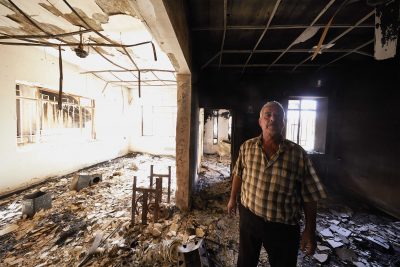
By Katie Ascough - 17 July, 2020

Louis Petrus (61) in his burned house, Qaraqosh, Nineveh Plains © Jaco Klamer, Aid to the Church in Need
According to Catholic charity Aid to the Church in Need, the international community is failing Iraq’s Christians as warning of a sharp fall of the Christian population in the next decade is predicted if no action is taken. According to a report by the charity, Christian communities in the Nineveh Plains could drop to 23,000 by 2024 – 80 per cent less than it was before Daesh (ISIS) attacked in 2014.
Neville Kyrke-Smith, national director of Aid to the Church in Need (UK), who visited Iraq and met Christians driven out by Daesh, said: “The international community must take immediate and decisive action to tackle the problems which are threatening the continuing Christian presence in Iraq. The Bishop of Truro’s Independent Review for the Foreign and Commonwealth Office identified failures by UN bodies – as we approach the first anniversary of the review it is more important than ever that the international community works together to prevent Christian numbers falling further in Iraq.”
Iraqi Christians interviewed for the report named harassment by the Iran-backed Shabak Militia and the Babylon Brigade as a particular problem. Other issues identified in the survey of Iraqi Christians included unemployment, financial and administrative corruption and religious discrimination.
ACN’s Middle East head Fr Andrzej Halemba, who co-authored the report, said: “The report is not pessimistic, but it is a clear warning because without concerted and immediate political action the presence of Christians in the region of the Nineveh Plains and its surroundings will be eliminated.” Pointing to the work that ACN has carried out to restore the destroyed settlements and communities, Fr Halemba said that, today, “36.2 per cent of [displaced] Christians have returned”.
ACN’s reconstruction plans for Iraqi Christian towns and villages on the Nineveh Plains have entered a new phase, aiming to rebuild the infrastructure of church-run facilities. Of the 363 churches and church-run buildings due to be rebuilt or repaired (34 totally destroyed, 132 burned, 197 partially damaged), 87 per cent provide support for the wider community. These include educational facilities, orphanages, residential care homes, clinics, as well as accommodation for staff at these centres, such as religious sisters who serve as teachers, nurses, etc.
Fr Halemba said: “On our side we will do everything in our power. Never should future generations say of us: you did too little, too late.”